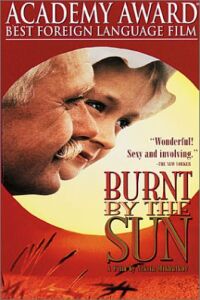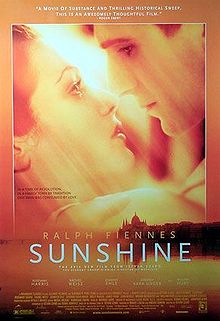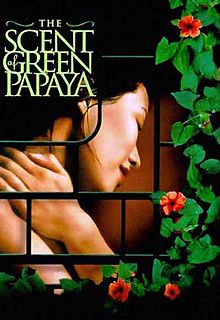 For the first two hours of this movie, the movie continues to depict a family chatting during summer in a village of artists in the countryside in the Soviet Union, as if we are gazing into the world of Chekov. While watching, we see that the father of the family is Commander Kotov, a legendary Red Army hero from the Russian Revolution, and it is likely that his young wife, because she lives in a villa with all her servants, is from a noble lineage and that the villa in this village of artists is her family’s villa. The Commander and his wife have a lovely daughter Nadia. Suddenly Dimitri—a young, handsome, aristocrat-looking artist—visits, and the wife’s family warmly welcomes him. Meanwhile, we learn that Dimitri is also noble in lineage, and that he and the wife were formerly lovers; everyone but the Commander starts conversing happily in French, and the Commander who doesn’t know French becomes slightly alienated. While viewers are wondering if this movie is story of a love triangle, in the last 20 minutes, it is revealed that Dimitri is actually part of the secret police, and that he came under Stalin’s orders to arrest Commander Kotov. Viewers must wonder why Dimitri, who should be part of the White Army because he is a noble, has the authority to arrest Red Army hero Commander Kotov.
For the first two hours of this movie, the movie continues to depict a family chatting during summer in a village of artists in the countryside in the Soviet Union, as if we are gazing into the world of Chekov. While watching, we see that the father of the family is Commander Kotov, a legendary Red Army hero from the Russian Revolution, and it is likely that his young wife, because she lives in a villa with all her servants, is from a noble lineage and that the villa in this village of artists is her family’s villa. The Commander and his wife have a lovely daughter Nadia. Suddenly Dimitri—a young, handsome, aristocrat-looking artist—visits, and the wife’s family warmly welcomes him. Meanwhile, we learn that Dimitri is also noble in lineage, and that he and the wife were formerly lovers; everyone but the Commander starts conversing happily in French, and the Commander who doesn’t know French becomes slightly alienated. While viewers are wondering if this movie is story of a love triangle, in the last 20 minutes, it is revealed that Dimitri is actually part of the secret police, and that he came under Stalin’s orders to arrest Commander Kotov. Viewers must wonder why Dimitri, who should be part of the White Army because he is a noble, has the authority to arrest Red Army hero Commander Kotov.
Nikita Mikhalkov directed this movie, wrote the script, and starred in it, and the little girl who played the Commander’s daughter Nadia is Mikhalkov’s daughter. Nikita Mikhalkov’s older brother is Andrei Konchalovsky, who is close friends with Andrei Tarkovsky, the director of Ivan’s Childhood. Nikita Mikhalkov’s father, Sergei Mikhalkov, wrote the lyrics to the Soviet Union national anthem. At first, this song by Sergei Mikhalkov was an overly admiring song for Stalin, and it became the national anthem of the Soviet Union in 1944; due to criticism of Stalin, Sergei Mikhalkov modified the song lyrics in 1977, and later in 2001, he completely changed the lyrics for the sake of a new Russia.
Stalin’s Great Purge occurred in the 1930s; after Stalin’s death in 1953, formal criticism of Stalin was started by Nikita Khrushchev, the First Secretary of the Communist Party of the Soviet Union, and the cultish worship of Stalin was publically criticized. After Khrushchev was overthrown in 1964, the power of reformists temporarily weakened and fluctuated under the administration of Leonid Brezhnev —as seen with the Soviet Union’s armed suppression of the Czech Republic’s Prague Spring; but in 1985, Mikhail Gorbachev resumed the criticisms of Stalin, and the honors of many victims were restored. Because this movie was made in 1994, some degree of freedom of speech must have been allowed, but the criticism against Stalin in this movie is very symbolic. The symbolism resembles that which is seen in modern Spanish movies that were made with extraordinarily beautiful images to the point of being awe-inspiring, and, out of fear of Franco’s oppression, relied on symbolism to convey criticism.
This movie also has beautiful images and mysterious symbolism that are awe-inspiring. Why does this movie keep explicit depiction of the terror of the purge to a minimum, and instead focus on fleeting beauty? I don’t know the answer since I don’t know Nikita Mikhalkov, but I feel like Nikita Mikhalkov is not a political person. For him, beautiful things—such as a beautiful heart—are most important, and he hates violence disguised as a revolution and murders under the name of the Purge because they are grotesque and not beautiful. However, if his delicate heart were to be caught up in something like politics, I don’t think it is his nature to handle it skillfully. In order to understand him more easily, I thought about Akira Kurosawa, whom Mikhalkov always considered, “a close friend, and the most important kindred spirit.” If Kurosawa made a movie about Stalin’s Great Purge, what would it be like? My answer is that Kurosawa wouldn’t make such a movie, even if he knew the truth of Stalin’s Great Purge. If hypothetically he did make such a movie, though, the movie would be very symbolic. I can understand why this movie is extremely symbolic when I think about it this way.
However, Nikita Mikhalkov is a man who expresses his feelings honestly. He supported Serbs—who were one-sidedly judged as criminals in the Bosnian War and thought of as international villains—by stating, “Don’t lose your identity as Serbs,” and supported Serbia’s policy regarding Kosovo. Also, he made clear his support for the leadership of Vladimir Putin. It seems like he is the type of person who acknowledges his feelings honestly regardless of what other people think. Based on what he has said, his political conviction might be, “Personally, I don’t recognize any government since 1917 that got their political power with violence and bloodshed as being legitimate.” Therefore, Burnt by the Sun may be dedicated to the victims who were burnt by the “fake sun” called the Revolution. People were one day unexpectedly taken away from their homes without any warning, and their family members never learned of their fate. Other people were humiliated in front of the general public in a false open court, and then later executed. Others were arrested and murdered even though they had nothing to do with politics. I think this movie is a requiem by Nikita Mikhalkov for these people.
 The Great Purge was large-scale political oppression directed towards the faction that opposed the Soviet Union’s supreme leader, Joseph Stalin, in the 1930s. As a warning, anyone who was considered to be against Stalin was forced to confess to crimes such as being a spy in trial and was given a death sentence; the targets were not only core politicians, but also common party members and the public. The objectives were to kill Stalin’s political opponents and to turn the public’s dissatisfaction regarding the slow advancement in the economy into hatred for traitors. In the end, the Purge even targeted heroes of the Red Army who contributed to the success of the Revolution, respected artists, and communists who came to the Soviet Union seeking refuge.
The Great Purge was large-scale political oppression directed towards the faction that opposed the Soviet Union’s supreme leader, Joseph Stalin, in the 1930s. As a warning, anyone who was considered to be against Stalin was forced to confess to crimes such as being a spy in trial and was given a death sentence; the targets were not only core politicians, but also common party members and the public. The objectives were to kill Stalin’s political opponents and to turn the public’s dissatisfaction regarding the slow advancement in the economy into hatred for traitors. In the end, the Purge even targeted heroes of the Red Army who contributed to the success of the Revolution, respected artists, and communists who came to the Soviet Union seeking refuge.
The reasons that the Great Purge finally ended in late 1938 were that the function of the government was hindered due to the massacre of many capable people, and that, since the Nazi threat had become a reality, the government was able to turn the dissatisfaction of the people into hatred towards the Nazis. Near the end of 1938, Stalin criticized the NKVD, the secret police organization that had until then been central to the Great Purge, and oppressed them. Ironically, the officials of the secret police, who had chased so many people to their death, were killed one after another, and it is said that few people from the NKVD were able to survive the Stalin period.


